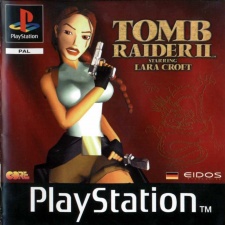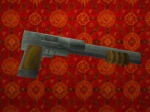Tomb Raider II
Tomb Raider II is the second game of the Tomb Raider games series. The story begins one year after the events of Tomb Raider Unfinished Business. An expansion came out in 1999 with a seperate 5-level adventure attached. This expansion was known as Tomb Raider II Golden Mask.
Contents
Release Dates in Detail
Windows
Coming Soon
PlayStation
- United States - 31st October 1997
- United Kingdom - 1st November 1997
- Germany - November 1997
- Japan - 22nd January 1998
Levels
China- 1 - The Great Wall
Venice
- 2 - Venice
- 3 - Bartoli's Hideout
- 4 - Opera House
Rig and Maria Doria
- 5 - Offshore Rig
- 6 - Diving Area
- 7 - 40 Fathoms
- 8 - Wreck of the Maria Doria
- 9 - Living Quarters
- 10 - The Deck
Tibet
- 11 - Tibetan Foothills
- 12 - Barkhang Monastery
- 13 - Catacombs of the Talion
- 14 - Ice Palace
China
- 15 - Temple of Xian
- 16 - Floating Islands
- 17 - The Dragon's Lair
England
- 18 - Home Sweet Home
Gameplay
While building up upon the gameplay of Tomb Raider, Lara's weapon arsenal has expanded. A full list is below. She can do all of the same moves from Tomb Raider as well as some new ones. These include climbing, performing a 180 degree manoeuvre in the water and in mid-air while jumping. Flares have also been added to Lara's inventory. She may run with one lit, or she can throw them. Also Lara may operate vehicles in the game which include a motorboat in Venice and a snowmobile in Tibet.
Lara herself has been constructed with more polygons. Her breasts and face look much rounder than they did in Tomb Raider. Her hair actually dangles in a ponytail, rather than being tied up in a bun previously. Her ponytail sways around outside due to wind but is stationary inside, providing Lara herself is stationary.
Instead of the usual medipacks and ammunition that posed as secrets in Tomb Raider, in Tomb Raider II there are 3 secrets per level which are 3 ornamental dragons. On each level the player has an opportunity to find the stone, jade and gold dragons. Some dragons might have ammunition, weapons and medipacks that accompany them when found. Lara also has two new outfits. She wears a wetsuit for the Rig and Maria Doria levels, and she wears an airjacket during the levels in Tibet.
Croft Mansion has also expanded. The player may now go outside and explore the attic, kitchen and basement. An assault course and hedge maze await the player outside. The mansion serves as the game's training level where the player may practice manoeuvres on the assault course, which can also be completed whilst being timed.
Story
Introduction
Legend has it that when you drive the Dagger of Xian into your heart, you acquire the power of the dragon. Literally.
In Ancient China, the Emperor was the holder of this power and with his army alongside him, he was a force to be reckoned with. Thus he staked claim to the vast lands that are China.
His final battle however ended in defeat. While people fell into submission all around him, the Warrior Monks of Tibet would not relent and courageously fought against his evil. Knowing the power of the dagger, they succceded in removing it from the Dragon Emperor's heart - reducing him and his army to carnage. The dagger was returned to its resting place within The Great Wall and locked up for all time...
Now three parties hold the dagger close to their heart. And all for entirely different reasons.
Lara, forever the adventurer, is one of these. In her travels, she will encounter the other two...
Locations
Gear
=== Weapons ===- Pistols (with unlimited Ammunition)
- Shotgun
- Uzis
- Automatic Pistols
- M16
- Grenade Launcher
- Harpoon Gun
First Aid
Vehicles
Characters and Enemies
Characters
- The villain of the game. He and his cult Fiamma Nera are also searching for the Dagger of Xian. Of Italian and Chinese decent, he is ruthless, evil and has no consideration for human life.
- A monk from Barkhang Monastery. He is a part of the Barkhang brotherhood who continue to keep the dagger secret by guarding the Talion, the key to opening the Temple of Xian. He was kidnapped and killed by Bartoli.
- The butler of Croft Mansion. He will appear in the training level at Lara's home. He follows her around with a tea tray and can be locked in the fridge by Lara if she gets bored.
Enemies
- Flamethrower Guys
- Giant Spiders
- Guardian of the Talion
- Mafioso Boss
- Moray Eels
- Rats
- Ravens
- Sharks
- Snow Leopards
- Snowmobilers
- Spiders
- Stone Warriors
Traps and Obstacles
Traps
- Boulders
- Collapsible Floor
- Disc Shooter
- Knife Blade
- Rolling Spindles
- Spikes
- Spike Walls (aka Spiky Movable Walls)
- Statue with Knife Blade
- Aquatic Mines
- Loose Boards
- Swinging Sandbag
- Glass Shards
- falling Sandbag
- falling Ceiling Fragments
- multiple Boulders (Avalanch)
- Air Fan
- Swinging Box
- rolling Storage Drums
- snow balls (Avalanch)
- detachable Icicles
- Slamming Door
- Spike Ceiling
- Spiky Ball
Obstacles
Development
Development of Tomb Raider II was already in its conceptual stages even before the first game was released. By the time Core was wrapping up Tomb Raider, many more ideas and suggestions had been put forth, some of which could be incorporated in the first game, others which would shape up to become the next installment of the series.
While several key members of Core Design had left (most notably Lara's creator Toby Gard), the design team for Tomb Raider II was drastically expanded to more than twice of its original size. Subsequently, the game took a shorter amount of time to develop than its predecessor. The decision to keep the engine from Tomb Raider was made early on, adopting a tweak-and-improve approach, rather than starting over from scratch. Minor camera issues and object glitches were fixed, while new features were added, such as dynamic lighting and a more flexible control system. Core Design used a custom built level editor that let them explore each stage as it was being created. This allowed the designers to test play levels on the fly and eliminate glitches.
Walkthrough
For a detailed walkthrough click here








